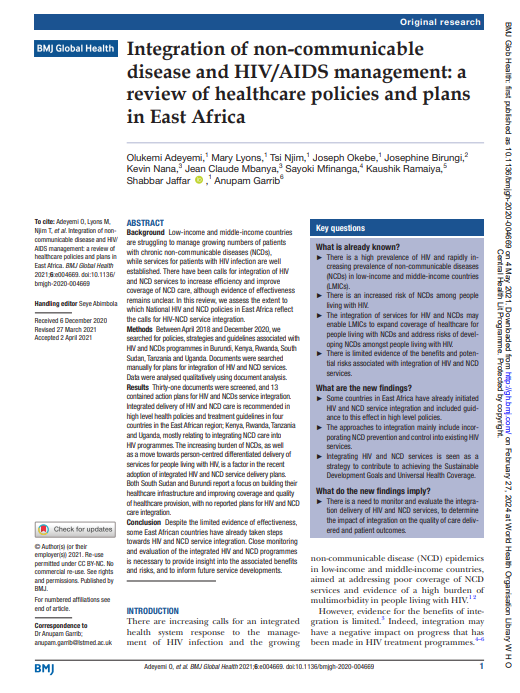Global Allergy & Airways Patient Platform
Atopic Dermatitis Doctor Visit Card
Guide
10 Feb 2026
04 May 2021

Low-income and middle-income countries are struggling to manage growing numbers of patients with chronic non-communicable diseases (NCDs), while services for patients with HIV infection are well established. There have been calls for integration of HIV and NCD services to increase efficiency and improve coverage of NCD care, although evidence of effectiveness remains unclear. In this review, we assess the extent to which National HIV and NCD policies in East Africa reflect the calls for HIV-NCD service integration.
Between April 2018 and December 2020, we searched for policies, strategies and guidelines associated with HIV and NCDs programmes in Burundi, Kenya, Rwanda, South Sudan, Tanzania and Uganda. Documents were searched manually for plans for integration of HIV and NCD services. Data were analysed qualitatively using document analysis.
Thirty-one documents were screened, and 13 contained action plans for HIV and NCDs service integration. Integrated delivery of HIV and NCD care is recommended in high level health policies and treatment guidelines in four countries in the East African region; Kenya, Rwanda, Tanzania and Uganda, mostly relating to integrating NCD care into HIV programmes. The increasing burden of NCDs, as well as a move towards person-centred differentiated delivery of services for people living with HIV, is a factor in the recent adoption of integrated HIV and NCD service delivery plans. Both South Sudan and Burundi report a focus on building their healthcare infrastructure and improving coverage and quality of healthcare provision, with no reported plans for HIV and NCD care integration.
Despite the limited evidence of effectiveness, some East African countries have already taken steps towards HIV and NCD service integration. Close monitoring and evaluation of the integrated HIV and NCD programmes is necessary to provide insight into the associated benefits and risks, and to inform future service developments.